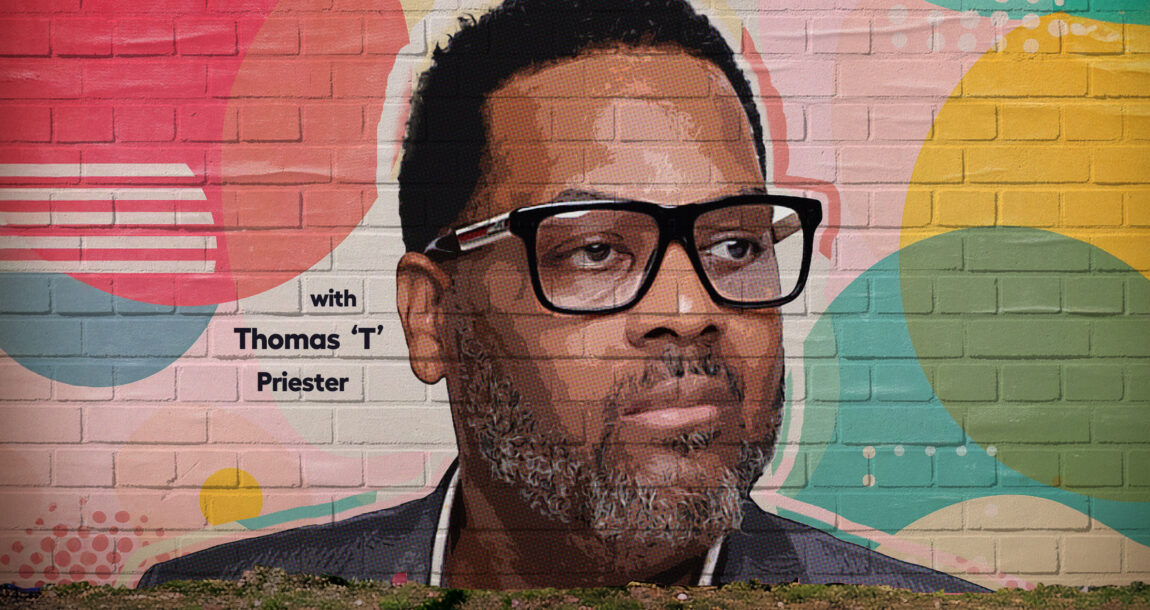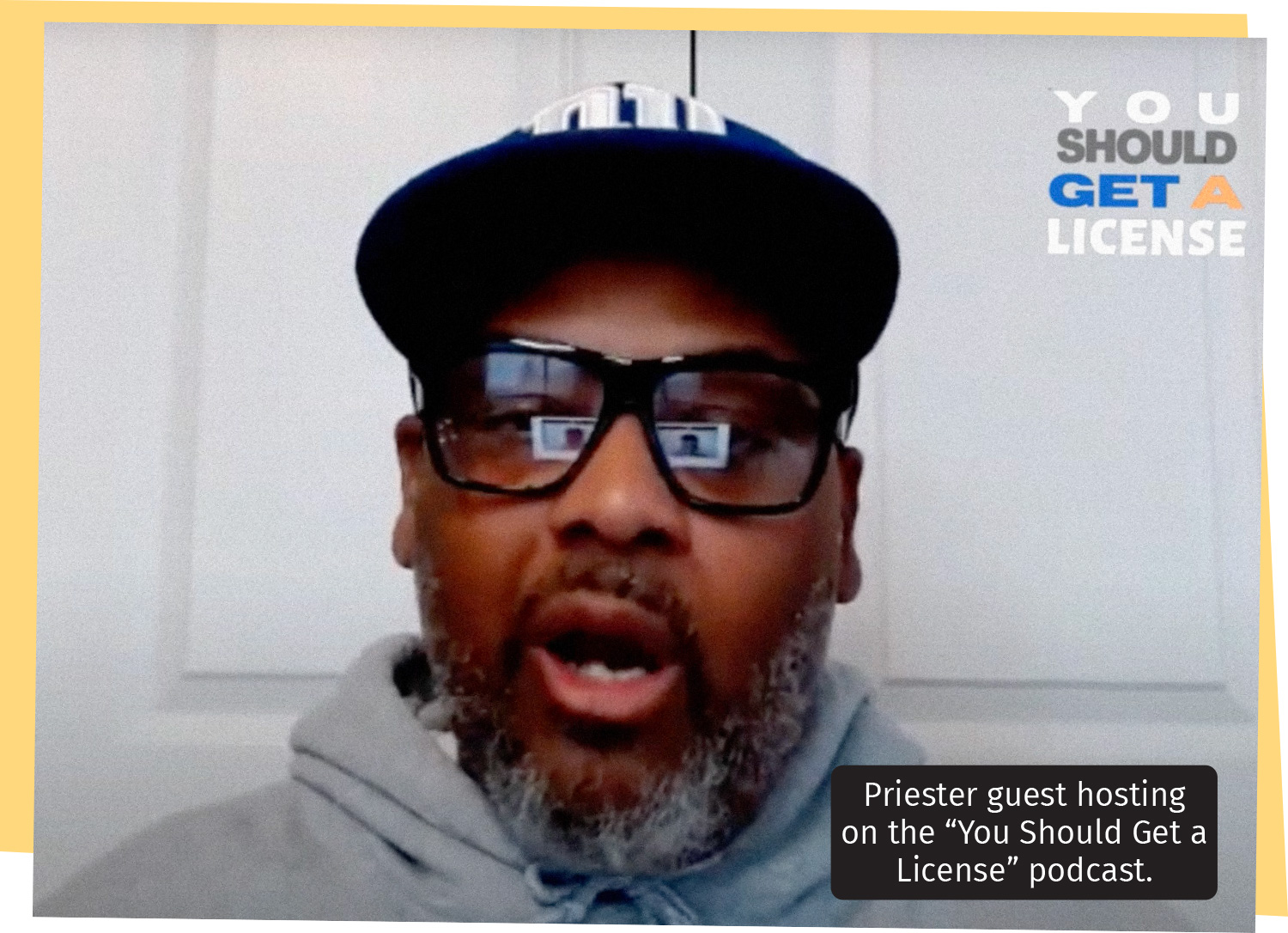A place to belong — with Thomas ‘T’ Priester

If serving in the Marine Corps taught Thomas ‘T’ Priester anything, it was this: After surviving bootcamp, he could handle whatever came his way — including rejection. It was the perfect mindset as he settled into a sales career in civilian life, eventually entering the insurance business.
Priester is president and founder of KORE Financial, a full-service insurance brokerage in Atlanta.
“Graduating from bootcamp was probably the most difficult thing I’ve ever done in my life,” he said. “So, when you are able to accomplish something that difficult, it puts things in perspective. If I can get through that, I can definitely handle some prospects telling me no. I’ve never had a problem dealing with rejection.”
Priester started working in commission sales after his time in the Marines was over, and he said he always knew “sales is a numbers game.
“I want to get the nos out of the way so I can get to the yeses. That’s always how I approached it. And when I walk away, I’ll ask them if there’s one thing I taught them that they didn’t know before I walked in. Interestingly enough, sometimes that would open the conversation back up again.”
Priester wanted an opportunity to do something bigger in sales, so he asked a friend for advice. When the friend suggested he look at an insurance career, he said the only thing he knew about insurance was that he was required to have coverage on his car.
“But my friend said there is a whole world outside of auto and home insurance,” Priester said. “He introduced me to someone he knew, who was a veteran in the industry, and I jumped right in.”
Starting in the senior market
Priester began his insurance career selling Medicare supplements. But he said, “I couldn’t find my footing in that market — I wasn’t connecting with that market.”
But then he found the life insurance side of the business and discovered that to be challenging as well.
“The first agency I worked for was in Baltimore,” he said. “They sent me to this low-income community. I’m new to the business and on my first day, every appointment that I had didn’t show. The next day, I went to another low-income area outside of Baltimore.
“At that time, Baltimore was a high-crime city. So here I am, talking to families about life insurance, and a woman said to me, ‘We don’t need life insurance. The state buries us.’ What I learned was that there were so many deaths in Baltimore at that time that bodies weren’t being claimed. So they would cremate the bodies and wait for someone to claim them. The state will find the body, they take them, nobody claims them, they cremate them, they put them in a box, they attach a name to it if they can. And that was the way that they handled burial in that community.”
Priester said he decided “I’m not going to spend my life working in these dangerous areas, talking to people who don’t want to buy this product.”
He relocated to Atlanta in 2006. “At that time, the Medicare prescription drug plan became mandatory, so now all the seniors were scrambling to get drug coverage,” he recalled. “And then Medicare Advantage zero-premium plans started to spread like wildfire. Even though I had said I would never work in the senior market again, this was something I couldn’t ignore.”
Medicare Advantage and other senior market products helped Priester open a conversation about other financial products. His practice began to take off.
“Here is where I started seeing success. After I would enroll someone in a Medicare product, there was an opportunity to go back and meet with them again to discuss life insurance.”
Some of his older clients were retiring and realized that the life insurance they had through their employer would not be there for them anymore. Others had funds sitting in a retirement account and turned to him to help them roll over those funds into an annuity. His senior clients referred him to their friends, and his business continued to grow.
“Sometimes agents overlook certain areas or certain clients because they think there’s no money there. And people don’t always tell you what they have upfront; they want you to build that trust before they let you completely in. So, I always tell agents, take your time, treat someone like that’s the only appointment you have that day.”
Out on his own
Priester was a manager at a large captive agency in the Atlanta area, but he grew disenchanted with their approach to recruiting agents. He became independent in 2011 and founded KORE Financial in 2014.
Growth was slow for the first year or two, and he said that was by design.
“I never really focused on building big,” he said. “I just wanted to have some agents who I could help get into the industry and find success.”
In 2019, his agency switched to a telesales model, which he said drove efficiency and growth. When COVID-19 forced agents to meet with clients remotely, business took off.
“Even before COVID-19, it didn’t make much sense for us to drive all over the metro area to meet with people who often weren’t there for the appointment,” he said. “And during the pandemic, agents and prospects didn’t want to meet in person. We noticed that by working in the office, talking with clients and prospects online all day long, we increased our sales and cut our expenses.”
The ability to work remotely helped boost agent recruitment as well, he said, and his brokerage eventually grew to 85 agents.

Priester may have started his career working with older clients, but today his brokerage’s client niche is made up of younger adults.
“We found we work really well with couples in their 30s and early 40s,” he said. “So we really doubled down and focused on that age group. It’s a great market for us because they want to protect their income. They’re buying homes, so they want to protect their homes. They want to plan for retirement, so we help them with annuities and indexed universal life. So this market is where we found our home.”
Teaching via YouTube
Priester uses YouTube, TikTok and Instagram to educate consumers on all things life insurance. He also does a podcast every Monday night. Creating engaging social media content on a consistent basis is time-consuming, but Priester said it is worth the effort.
“I’m doing videos, I’m editing, I’m networking and talking with clients,” he said. “You have to put in the time and be consistent.”
He also is a frequent guest on podcasts, where he educates consumers in the Black community about the importance of life insurance beyond paying for a funeral.
A safe space for Black agents
In his work with agents, Priester found that many Black agents weren’t getting the information they needed from their independent marketing organization. Many of them didn’t have strong relationships with other professionals in the industry and needed opportunities to network and learn.
He discussed this situation with another Atlanta-area agent he knew, Che Norman, and they decided to create what he called “a safe space for Black agents.” The Society of Black Agents was born four years ago.
“We wanted to create a group of peers, where you can connect with people who understand you — not just from an industry perspective but from a racial perspective,” he said. “It’s a place where you can have conversations with people who have had different experiences — everyone from a guy who’s third generation in the business to the woman who is just getting in the industry.”
Priester said “a lot of organic relationships” soon developed among SOBA’s members.
“We found people saying to each other, ‘Let’s meet for lunch,’ or ‘Let’s connect on social media,’” he said. “We started seeing it grow to where we created this community where agents felt comfortable simply talking to each other.”
Priester said he found many industry organizations to be “focused on the agent/carrier relationship.” SOBA focused on peer-to-peer relationships, he said.
“Once we had these agents feeling comfortable with each other, we wanted to make sure they’re successful, because we started seeing a lot of them were really open about their lack of success in the industry.”
But although SOBA began offering training and mentoring to its members, Priester said there was a larger audience that needed education about insurance and financial products.
“We decided to equip our members to go out and better serve and educate our communities,” he said.
SOBA also is addressing the issue of recruiting more young Black adults to enter the profession.
“One thing Black-owned agencies struggle with is not having a succession plan,” Priester said. “And most Black households aren’t talking to their kids about becoming insurance agents when they grow up. We’re trying to create a pipeline where we can take a kid from high school or college, get them interested in the industry and create a pathway to success for them.
“We’re working with schools to help students get their prelicensing and continuing education credits. We’ll work with established agencies that are willing to give internships or paid opportunities, so these new agents can come into the industry right away and start making money right away.
Susan Rupe is managing editor for InsuranceNewsNet. She formerly served as communications director for an insurance agents' association and was an award-winning newspaper reporter and editor. Contact her at [email protected].





2025: Taxing decisions due
Yes, the fiduciary rule is probably history, Capital Group analysts say
Advisor News
- Help your clients navigate tax regulations
- CFP Board announces CEO leadership transition
- State Street study looks at why AUM in model portfolios is increasing
- Supreme Court to look at ERISA rules in upcoming Cornell case
- FPA announces passing of CEO, succession plan
More Advisor NewsAnnuity News
Health/Employee Benefits News
- Massachusetts hikes tax penalty for the uninsured
- The Operating Room's Time Clock
- Millions of Texans could face higher costs for worse health insurance
- OUR VIEW: Health care is missing its foundational mark
- My Spin: What if the state health plan goes broke?
More Health/Employee Benefits NewsLife Insurance News
- 10 reasons we must embrace the Northwestern Life Insurance building in Minneapolis
- AM Best Revises Outlooks to Stable for Lincoln National Corporation and Most of Its Subsidiaries
- Aflac Northern Ireland: Helping Children, Caregivers and the Community
- AM Best Affirms Credit Ratings of Well Link Life Insurance Company Limited
- Top 8 trends that will impact insurance in 2025
More Life Insurance News